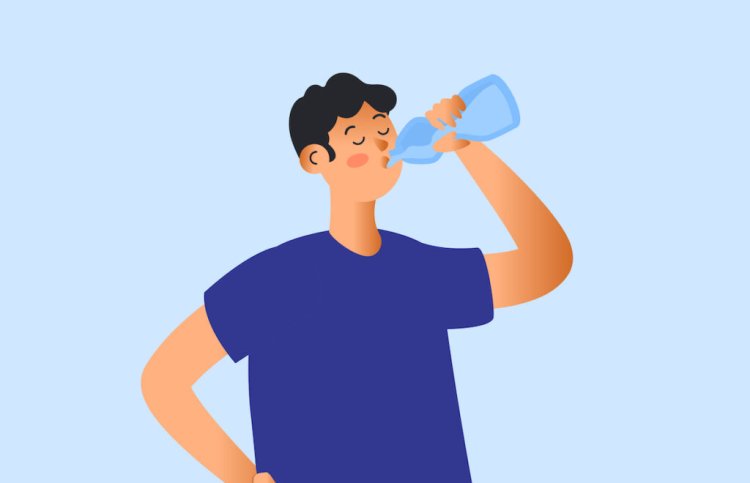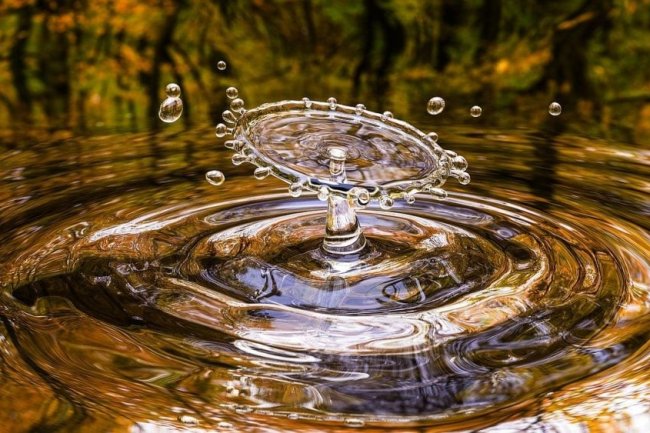Drinking Water: Why is it beneficial?
In this article, we will explore the vital role of water in bodily functions, debunk hydration myths, and discover practical tips for optimal hydration. Unravel the connection between hydration and mental wellness.

We've all heard it: 'Drink more water!' But beyond quenching thirst, water plays a pivotal role in the symphony of our body's processes. In the quest for optimal well-being, understanding the profound significance of hydration is paramount. Join us in unraveling the intricate dance between water and our body functions. In this exploration, NourishNetBlog.com delves into the essence of hydration, exploring why water is essential, its multifaceted roles within us, and the alarming consequences of dehydration. Let's quench not just our thirst, but also our curiosity about the elixir of life.
Stay tuned for personalized insights on hydration by subscribing to our blog. Share your thoughts on hydration and your water intake habits in the comments below.
NourishNetblog is passionate about unraveling the secrets that water holds for our bodies. Join us as we explore the intricate science of hydration, from its cellular impact to its role in maintaining overall health. Together, let's hydrate our bodies and minds for a healthier, more vibrant life.
Key Objectives of this Article
-
The Essence of Water: Uncover the fundamental reasons why water is essential for life, exploring its role in nutrient transportation, temperature regulation, and cellular functions.
-
Hydration and Body Functions: Delve into the specific functions within the body that rely on adequate hydration, from digestion and metabolism to joint lubrication and skin health.
-
Dangers of Dehydration: Understand the alarming consequences of dehydration, ranging from fatigue and dizziness to severe complications in organ functions, emphasizing the importance of consistent water intake.
-
Balancing Hydration: Learn practical tips on maintaining proper hydration levels, even beyond the sensation of thirst, ensuring the body's intricate balance is maintained.
-
Hydration Myths Debunked: Address common misconceptions about hydration, distinguishing between myths and scientific truths, empowering readers with accurate knowledge.
-
Water and Mental Wellness: Explore the connection between hydration and mental health, uncovering how water intake influences mood, cognition, and overall brain function.
Let's embark on this enlightening journey into the world of hydration. Share your thoughts and questions about water and hydration in the comments below, and don’t forget to subscribe for tailored insights on maintaining optimal hydration levels.
The Essence of Water
Water, the elixir of life, is not merely a thirst quencher. It's a foundational element, constituting about 60% of the human body. Every cell, tissue, and organ relies on water to function effectively. It acts as a lubricant for joints, regulates body temperature, and aids in digestion. Water is the primary vehicle for nutrient transportation, ensuring that vital substances reach cells and tissues efficiently. Additionally, it acts as a natural detoxifier, flushing out waste products and toxins, promoting overall bodily harmony. Understanding the essence of water illuminates its indispensable role in sustaining life itself.
Hydration and Body Functions
Within our intricate biological orchestra, water performs a multitude of functions. It facilitates digestion, breaking down food particles and aiding nutrient absorption. Proper hydration supports metabolism, enabling efficient energy production and utilization. Water ensures that joints are adequately lubricated, promoting smooth movements and preventing discomfort. Moreover, it nurtures vibrant skin, maintaining elasticity and radiance. From the cellular level to the surface of our skin, hydration is the cornerstone of optimal bodily functions.
Dangers of Dehydration
Dehydration, the consequence of insufficient water intake, poses severe threats to our health. Mild dehydration can cause fatigue, dizziness, and impaired concentration. In more severe cases, it leads to complications like kidney stones, urinary tract infections, and heat-related illnesses. Chronic dehydration can impair organ functions, contributing to long-term health issues. Recognizing the signs of dehydration and prioritizing consistent water intake is vital to safeguarding our well-being.
Share your hydration routine: How do you ensure you stay properly hydrated throughout the day? Comment below and inspire others with your strategies!
Balancing Hydration
Balancing hydration extends beyond responding to thirst. It involves understanding our body’s unique needs, influenced by factors such as physical activity, climate, and overall health. Monitoring the color of urine can provide valuable insights into hydration levels; pale yellow indicates proper hydration, while dark yellow signals dehydration. Integrating water-rich foods like fruits and vegetables into our diet contributes to overall hydration. Cultivating the habit of sipping water consistently, even when not thirsty, maintains the delicate equilibrium within our bodies.

Hydration Myths Debunked
Let's debunk prevalent hydration myths, empowering ourselves with accurate knowledge. Myth: "Caffeinated beverages dehydrate you." While caffeine has a mild diuretic effect, moderate consumption doesn't lead to significant dehydration. Myth: "Thirst means you're already dehydrated." Thirst is a signal to drink, but it doesn't necessarily mean you're severely dehydrated. Trust your body's signals but also maintain regular water intake. By dispelling these myths, we pave the way for informed hydration practices, ensuring our bodies and minds thrive.
Another prevalent misconception is that thirst is the only indicator of dehydration. In reality, thirst kicks in after the body is already mildly dehydrated. Another myth suggests that only water counts toward hydration, neglecting the contribution of beverages and water-rich foods. By debunking these myths and understanding the science of hydration, we empower ourselves to make informed choices, ensuring our bodies receive the hydration they need.
Stay tuned as we explore the intimate connection between hydration and mental wellness, unravel the myths surrounding hydration, and provide practical tips for maintaining optimal hydration levels. Your journey to understanding the essence of water continues. Share your thoughts and questions about hydration in the comments below, and don’t forget to subscribe for personalized insights on this vital topic.
Water and Mental Wellness
The impact of hydration transcends the physical realm; it profoundly influences our mental well-being. Dehydration can impair cognitive function, leading to decreased alertness, poor concentration, and memory lapses. Studies have shown that even mild dehydration can alter mood, increasing feelings of anxiety and irritability. Proper hydration, on the other hand, enhances mental clarity, promoting a sense of calm and balance.
Read More: The Benefits of Meditation on Mental Health
Adequate water intake supports the brain’s neurotransmitter production, crucial for regulating mood and emotions. By nurturing our bodies with water, we nurture our minds, fostering a state of mental equilibrium.
Practical Tips for Optimal Hydration
Maintaining optimal hydration levels is a daily commitment.
- Set a Water Goal: Calculate your daily water intake needs based on your weight and activity level; aim to meet this goal consistently.
- Carry a Water Bottle: Keep a reusable water bottle with you; it serves as a reminder to drink water throughout the day.
- Infused Water: Add natural flavors like cucumber, mint, or citrus to make water more appealing and encourage regular consumption.
- Create a Schedule: Establish specific times to drink water, such as after waking up, before meals, and during breaks at work.
- Monitor Urine Color: Check your urine color; light yellow indicates proper hydration, while dark yellow signals dehydration.
- Incorporate Hydrating Foods: Consume water-rich foods like fruits, vegetables, and soups to enhance overall hydration.
- Avoid Excessive Caffeine: Limit caffeinated beverages, which can lead to dehydration; balance them with equal amounts of water.
Share your hydration journey: What methods work best for you in staying adequately hydrated? Comment below and inspire others on their hydration quest!
Join Our Hydration Revolution!
We invite you to join our hydration revolution. Embrace the transformative power of water, not just as a beverage but as a life-enhancing elixir. Subscribe to our blog for personalized insights on hydration, tailored to your unique needs. Share your thoughts, questions, or experiences with hydration in the comments below. Let’s support one another in our journey toward optimal hydration and overall well-being. Your path to a well-hydrated, healthier you begins now.
As we conclude this exploration, remember, water isn't merely a daily requirement; it's a source of vitality.
Subscribe now for personalized hydration insights and join our community of well-hydrated enthusiasts. Let’s revolutionize our hydration habits and embrace a healthier, more vibrant life!
Resources:
https://familydoctor.org/hydration-why-its-so-important/
https://en.wikipedia.org/wiki/Hydration
https://www.hsph.harvard.edu/news/hsph-in-the-news/the-importance-of-hydration/
What's Your Reaction?




















